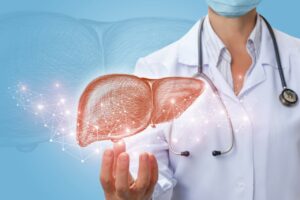What is the function of the liver? |

When I think about the liver, I’m often reminded of a comedy sketch from a Monty Python movie. In the sketch, organ donor nurses arrive at a patient’s home, requesting her liver before she is deceased. When the patient complains that she “hasn’t finished with it yet” the nurses launch into a whimsical song about how insignificant humans are compared to the vast size of the universe, and in the end, the patient reluctantly agrees to give them her organ, and the surgery commences in her living room. All completely silly, but the song is quite catchy.
But, I digress. The liver is a 3 pound, football-sized organ that sits just under the right rib cage. It is remarkably complex in its function, and does everything from detoxifying the blood (including breaking down medications and dumping them into the intestine where they are removed in the stool), producing blood clotting factors and various proteins, digesting fat and protein (the gall bladder stores soap-like chemicals produced by the liver), and storing glucose, vitamins and minerals, and helping to control metabolism. I think of it as a big, multi-functional factory that we can’t live without.
What injures the liver?
- Alcohol: chronic, excessive alcohol consumption can cause inflammation of the liver cells which can lead to cirrhosis and eventually liver failure.
- Obesity: being very overweight can cause fat to be stored in the liver which disrupts its function. “Fatty liver” can cause liver failure in severe cases.
- Hepatitis Viruses: there are several viruses that attack the liver cells and can cause severe damage. Hepatitis B and C are the most dangerous, though great strides have been made in treating these viruses, such that hepatitis is now considered curable in most cases.
- Medications: the liver is full of enzymes that break down toxins and medications, but some medications can irritate, inflame, or even cause liver failure in large quantities. Acetaminophen is probably the best known liver toxin in large doses.
- Gall Stones: gall acts like soap, helping to break down fat and protein in the foods we eat. The extra soap (made by the liver) is stored in a sac called the gall bladder. Sometimes this soap gets a little dry and forms “stones” which can get stuck in the liver and cause pain and infections that can be life threatening. Interestingly, gall is very intensely colored (kind of neon green or yellow) and when it leaks into the blood stream, it can turn the skin yellow – which is what we call “jaundice” and is a sign of liver injury.
- Liver Cancer: cancer that starts in the liver is fairly rare, but very dangerous. Because all the blood returning to the heart goes through the liver, it is a common collecting station for other cancers that metastasize from elsewhere. Cancer that has not spread too widely in the liver may still be surgically removed and cured. Because amazingly, the liver is capable of regenerating – and when one of its lobes is removed, we can still survive quite nicely.
- Genetic Disorders: there are some genetic diseases that cause large amounts of substances to be stored in the liver (such as iron or copper) which can clog it up and enlarge it and harm its ability to function.
- Autoimmune Disease: sometimes the immune system attacks liver cells, resulting in significant damage to the bile ducts and liver tissue.
- Parasites: although we don’t think much about parasites in the United States, in the rest of the world, over 35 million people suffer from liver fluke parasites (from eating undercooked or raw river fish) that crawl up into the bile ducts and can even cause cancer!
What happens when the liver fails?
Although the liver is a fairly resilient organ, due to the fact that it can actually grow back when it is injured (the only organ that can do this!) sometimes it can become injured beyond repair, and then it goes into full failure with these results:
- Blood flow backs up: if the liver is very inflamed and swollen, the blood that usually travels through it very easily cannot get through. This causes a big back up, and under high pressures, the liquid portion of the blood leaks into the belly (called “ascites”), and veins in the neck, face, and belly can become swollen (called “varices” and “telangiectasias”).
- Gall spills into the bloodstream: causing yellow-looking skin or “jaundice.”
- The blood stops clotting: due to inability to produce clotting factors, the blood becomes very thin and prone to bleeding. In combination with the back-up I described above, you can see how bleeding is a serious risk in liver failure.
- Toxins build up in the blood, causing mental status changes, nausea, confusion, and lethargy.
How can I keep my liver healthy?
- Do not drink excessive alcohol.
- Maintain a healthy weight.
- Be careful to follow dosing instructions on drug facts labels, especially acetaminophen.
- If you have gallstones, discuss your options with your doctor. If you have severe right-sided abdominal pain (especially after eating a fatty meal), get that checked out right away. Infected, trapped gallstones can be life threatening.
- If you become jaundiced, see your doctor right away.
- Practice safe sex – hepatitis C virus is very contagious through sexual contact and/or through contact with infected peoples’ blood.
- Get vaccinated against Hepatitis A and B before going to countries where they are common.
- Don’t share needles. Hepatitis C is very contagious.
The good news is that for those with end-stage liver failure, transplantation may be an option. Liver transplants are usually very successfully, though unfortunately there are about 15,000 people on the waiting list for one right now in the United States. I myself have chosen to be an organ donor, and I hope you’ll consider it too. Because (heaven forbid) if we are in an accident, at least that way we can give the gift of life to others. I have no doubt that (unlike that comedy sketch) there will not be a man who climbs out of our refrigerator to sing us a song about giving up our livers before we’re finished with them!
References
https://www.ncbi.nlm.nih.gov/pubmedhealth/PMH0072577/
http://www.mayoclinic.org/diseases-conditions/liver-problems/basics/causes/con-20025300
http://www.liverfoundation.org/abouttheliver/info/transplant/
If you have any more questions just Ask Hanna, our health advisors are here to help.
Image: ©Shutterstock / Natali_ Mis








